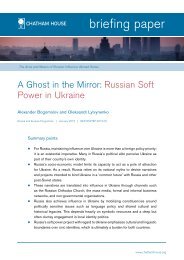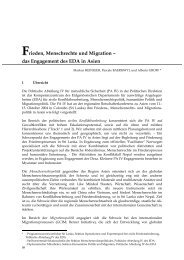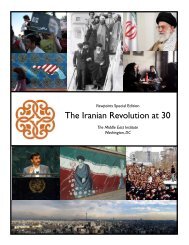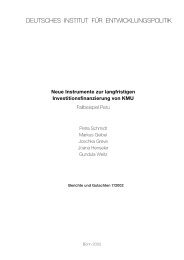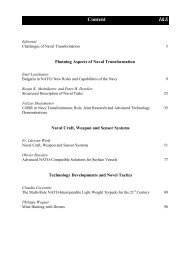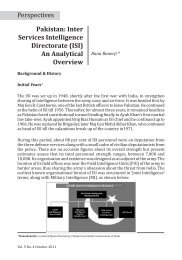Andreas Stamm Eva Dantas Doris Fischer Sunayana ... - ETH Zürich
Andreas Stamm Eva Dantas Doris Fischer Sunayana ... - ETH Zürich
Andreas Stamm Eva Dantas Doris Fischer Sunayana ... - ETH Zürich
You also want an ePaper? Increase the reach of your titles
YUMPU automatically turns print PDFs into web optimized ePapers that Google loves.
Box 4: Internationalisation of innovation systems in anchor countries<br />
22<br />
<strong>Andreas</strong> <strong>Stamm</strong> et al.<br />
Science, technology and innovation (STI) policy, a traditionally inward-oriented policy field, is increasingly<br />
becoming part of global politics. Over decades, governments in Western European countries, the US and<br />
Japan pursued explicit strategies to enhance their performance in research-based innovation and science.<br />
They delegated responsibility to intergovernmental organisations (IO) such as the Organisation for Economic<br />
Co-operation and Development (OECD) and special entities at the United Nations (UN) to refine the<br />
formation of science- and innovation-related policies and their impact on economic development. Since the<br />
end of the Second World War, a fragmented architecture of ‘global governance’ in STI has come into existence.<br />
Beyond the regulation of intellectual property rights (IPR), several global governance institutions have<br />
begun to provide models and policy guidelines elaborated on the basis of their own research or in collaboration<br />
with social scientists with the objective of promoting STI in the developing world.<br />
Anchor countries play a threefold role in this setting: First, anchor countries pursue explicit science and<br />
innovation policies to increase their international competitiveness and raise the welfare of their societies.<br />
Their governments are experienced in STI policy making in different development contexts, often in close<br />
contact with intergovernmental organisations. They now also provide models for STI policy for less developed<br />
countries.<br />
Second, following decades of inward-oriented science and technology policy, their strategies have shifted<br />
towards outward and systemic innovation policy. Some governments in anchor countries assume the role<br />
of driving forces in voicing the interests of the developing countries in international organisations. Brazil<br />
and Argentina initiated a development agenda for World Intellectual Property Organization (WIPO) to<br />
ensure that the institution aligns its activities to the UN Millennium Development Goals. 2003 saw the<br />
emergence of the India-Brazil-South Africa (IBSA) Dialogue Forum, which has a programme on science<br />
and technology cooperation. Furthermore, the G8 invites the governments of selected anchor countries,<br />
the so called O5, Mexico, China, India, Brazil and South Africa, to join its annual summits. The OECD<br />
also initiated ‘outreach programmes’ with selected anchor countries that allow them to participate in and<br />
observe the committee meetings.<br />
Third, as global problems grow, these countries are indispensable partners for collective action to promote,<br />
quickly and efficiently, research and infrastructure for technological innovation - although there is<br />
as yet no common understanding as regards how to best to organise multilateral research cooperation.<br />
There are, thus, good reasons to consider anchor countries as strategic partners in internationally<br />
coordinated efforts to quickly bring about the innovations required for the transition<br />
towards a sustainable development path. This is mainly due to three reasons:<br />
— due to their large and quickly growing environmental footprint, technological change<br />
is essential in these countries;<br />
— they have significant technological capabilities that enable them to contribute to the<br />
development of sustainable solutions;<br />
— technologies developed under the ecological conditions and factor endowments of the<br />
anchor countries could prove to be more adequate to be rolled out in less advanced developing<br />
countries in their world region than those developed in industrialised countries.<br />
Setting up R&D cooperation networks between industrialised and anchor countries might,<br />
however, see itself faced with some specific challenges. Private companies in OECD<br />
countries that are owners of technologies may be very reluctant to share specific knowledge<br />
with anchor countries, as they fear increasing competition in high-end markets from<br />
non-traditional actors that, while catching up technologically, benefit from considerably<br />
lower production costs. It is thus not surprising that the question of how to deal with IPR<br />
issues still remains highly contentious in international negotiations, and is especially<br />
prominent in the context of climate change mitigation (Ockwell 2008, 4104).<br />
German Development Institute / Deutsches Institut für Entwicklungspolitik (DIE)




